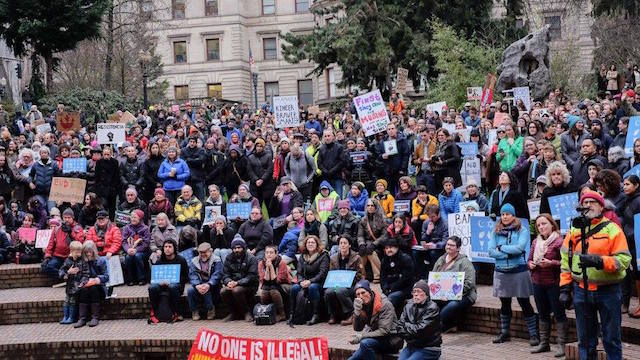
Photo by Kathryn Kendall
Story by Pete Shaw
In a boisterous show of solidarity, over 1,000 people came together Monday January 30 for a No Ban, No Wall rally. The assembly was composed of a wide array of individuals and city, state and regional organizations opposed to President Donald Trump’s racist executive orders banning immigrants and refugees from seven Muslim-majority nations and approving construction of a massive wall along the US-Mexico border with deficit funding. Speakers affirmed their support of Muslims, immigrants, and refugees and urged resistance to Trump’s order. The noontime rally at Terry Schrunk Plaza was one of numerous actions held across the country since Trump signed the order on Friday January 27 and, as with the anti-Trump inaugural rallies and women’s marches held two weekends ago, saw numerous new faces standing up in the face of oppression.
“We are going to push back,” announced Kayse Jama, Executive Director of Unite Oregon, which helped organize the rally. “We are going to make sure that we–as a country, as a community–are going to stand for justice. There is no middle ground in this fight. You stand for justice. You stand for unity.”
Among the finer points of Trump’s executive orders are a requirement that local law enforcement collaborate with Immigration and Customs Enforcement (ICE), punitively subjecting anyone “facilitating the presence of” people without documentation to a $1,500 fine or six months in jail, and establishing a racist ban on the admission of immigrants from Iran, Iraq, Libya, Syria, Somalia, Sudan, and Yemen–all of which have Muslim-majority populations. The mandate also unconstitutionally denies legal permanent residents (“green card holders”) from those seven Muslim-majority countries re-entry into the United States, something that, similarly to the massive ICE raids, detentions, and deportations of the Obama and W. Bush Administrations, will tear apart families and communities.
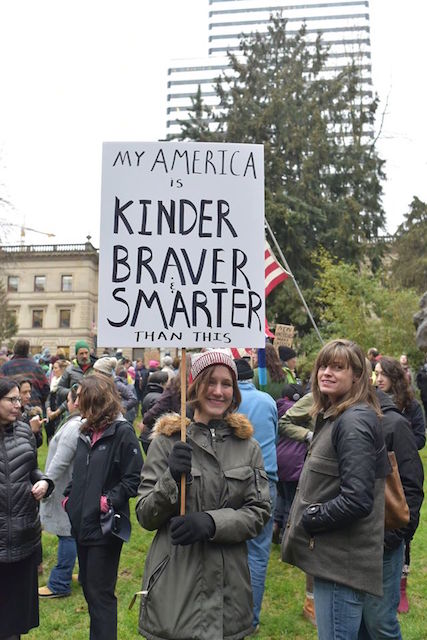
Photo by Pete Shaw
(Since signing the orders, the Trump Administration has backtracked on the provision affecting green card holders. On Saturday, an administration official announced that green card holders would have to be cleared into the US on a case-by-case basis. Later, Trump’s chief of staff Reince Priebus stated that “as far as green card holders moving forward, it doesn’t affect them.” On Sunday night, Homeland Security Secretary John Kelly confirmed Priebus’ declaration in a written statement reading, “In applying the provisions of the president’s executive order, I hereby deem the entry of lawful permanent residents to be in the national interest. Accordingly, absent the receipt of significant derogatory information indicating a serious threat to public safety and welfare, lawful permanent resident status will be a dispositive factor in our case-by-case determinations.”)
Equally grievously, Trump’s executive orders prevent all refugees from entering the country for 120 days, and indefinitely bar refugees from Syria, a country whose people have been devastated by many years of civil war.
“These policies will not make us safer as a country, but rather they repeat the sad history of exclusion that colors America’s past,” said Jama, a U.S. citizen, originally from Somalia. “These actions are not only against the United States Constitution, but they also go against the American value of welcoming people escaping persecution.”
Trump’s orders resulted in large numbers of people flooding to airports throughout the US, clogging traffic, and demanding they be rescinded. On Saturday, over 1,200 people–including Senator Jeff Merkley, Representative Suzanne Bonamici, and Mayor Ted Wheeler–descended upon Portland International Airport, shutting down the upper roadway, which airport administrators quickly declared a “free speech zone.”
While Trump’s hateful, racist rhetoric during his primary and general election campaigns should make the general tenor of his executive orders unsurprising, his intensity and wide-ranging callousness and cruelty clearly was beyond many people’s expectations. To be more precise, beyond many white people’s expectations. As City Commissioner Amanda Fritz noted at Monday’s rally, “About the only good thing I can think about the person who’s currently occupying the White House is that people with my color skin are just as terrified–or understand the terror of people with a different skin color and the things that people have known for decades which some of us were clueless to.”
“So those folks,” Fritz continued, “I apologize that it’s taken a lot of us…it’s a learning curve, and we’re all together, so thank you for your help in telling us what we need to do to be strong allies.”
Following Fritz, speakers elaborated upon what it would mean for white people to be those strong allies. Maria Delgado of Unite Oregon was swept up in the 2007 ICE raid of the Fresh Del Monte food processing plant in North Portland, which resulted in the arrests of 168 people. In the days following the raid, teachers and neighbors found themselves trying to explain to children where ICE had disappeared their parents and guardians. Other children, not directly affected by the raid, expressed worry that they, their parents, and their friends would too be taken away.
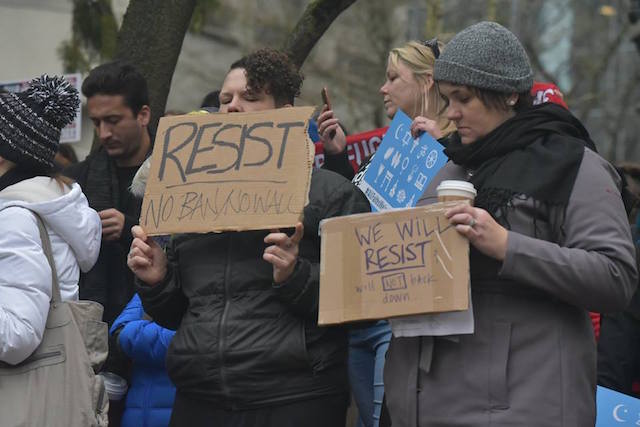
Photo by Pete Shaw
“It hurts me a lot to have to return to the traumas of 2007 and the deportation proceedings that we faced then,” Delgado told the crowd. “I’m thankful for everyone’s presence. There are a lot of people in the community who cannot join us right now. There are a lot of people here who can speak up for individuals in the community who can’t use their voices for themselves at the moment. The community is here in this country because we’re here to work. When immigration captured us back in 2007, they caught me while I was working, while I was in my company at work. And thank you everyone for being here for the community, for using your voice to advocate for immigrant and refugee community members who are all welcome here in this state. Thank you all.”
Of course, there has been a protracted war against Muslims in the United States dating back at least to the terrorist bombings of September 11, 2001 (although it must be noted that 19 of the 21 men who were alleged to have hijacked the jets that slammed into the World Trade Center towers, the Pentagon, and Shanksville, Pennsylvania came from Saudi Arabia, which is not affected by Trump’s executive orders).
The Trump Administration’s rhetoric and actions have seemingly already furthered the terror many Muslims, and people perceived as Muslims, feel in the US as well as beyond its borders. On Sunday night, a 27 year old male white supremacist murdered six people and injured eight in a mass shooting at a mosque in Quebec City, Canada.
Nancy Haque, co-Executive Director of Basic Rights Oregon announced, “I am also queer, I am also Muslim, I am also the daughter of immigrants. Every part of my identity feels under attack from this administration. Friday’s executive order will not make us safe. For American Muslims and communities of color that are perceived as Muslim, the increase of racial profiling and harassment and violence have already begun, like what happened Quebec last night where five people were killed in a mosque. We cannot and should not get used to this.”
D. Pei Wu, Executive Director of Portland Jobs with Justice and the daughter of Chinese immigrants, noted that discrimination against people by nationality is nothing new in the US. The Chinese Exclusion Act of 1882 prohibited the immigration of Chinese workers and was the first implemented law preventing a specific ethnic group from coming to the US. Wu noted, “We have a long history in this country of doing things that are not based in our values of justice, dignity, and love.”
The various rallies and marches that have erupted since Trump took office on January 20 have seen many people for the first time getting involved in protesting their government. At Saturday’s rally at the airport, one white woman gleefully proclaimed to a stranger that this was only the second rally she had ever attended. The white man to whom she spoke stated that he too was new to it.
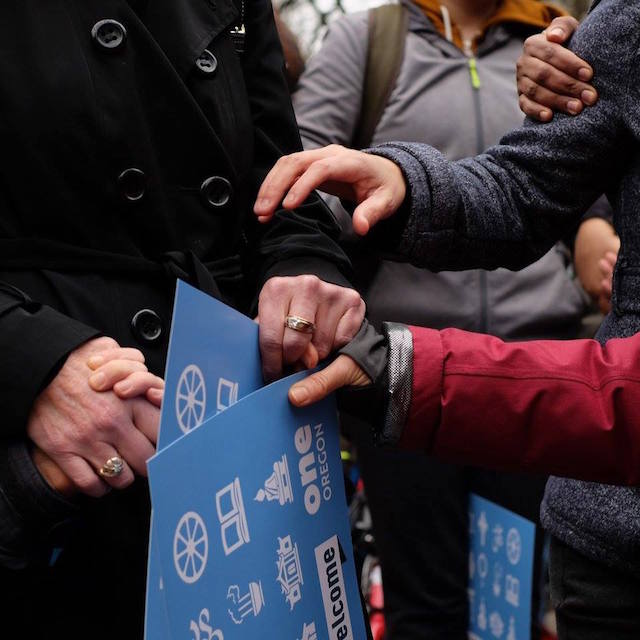
Photo by Kathryn Kendall
There is a tendency–particularly in the short run when it seems like no progress is being made– for people to be discouraged and retreat to the perhaps relative satisfactions and comforts of giving up. But as Raahi Reddy, Vice-Chair of the Asian Pacific American Network of Oregon (APANO), told the audience, “Everything you do, I just want you to know, it may feel like you are just grabbing in the dark, but it matters. Showing up matters.”
Reddy also drew connection between economic downturns, such as the recent crisis that began in 2008, and racist oppression. “We are in an unprecedented time. With over 250,000 Asian Pacific Islanders here in Oregon, over 50% of them are those who have immigrated, and refugee communities here are feeling the impact every day. In these times, our community members are being particularly targeted and demonized and scapegoated. And we know what happens in dark economic times is that in Oregon, unfortunately, our history is we turn. We turn on immigrants. We turn on people who are different than us.”
While outlining and condemning the problem, Reddy also offered solutions, some of which came from personal experience. “We stand with all the communities that have been targeted. Our people, first of all, need to feel safe. And I think one of the things that I am shocked by is that even going to the grocery store is a scary thing when you are being targeted by the President of the United States. After 9/11, as a south Asian, as an Indian American woman, I was terrified to leave my house, and I lived in one of the most progressive neighborhoods in all of California, and that matters. So when I say to you that people need to feel safe, that means going home and talking to your neighbors and putting up signs in your windows or whatever it takes to let people know–anybody that comes to your neighborhood–that they can count on you if anything goes wrong. I just want to know my neighbors have got my back.”
Reddy finished by exhorting the crowd, “So do you have your neighbors’ back?” A resounding cheer erupted from the audience.
Amina Rahman of SEIU Local 49 echoed Reddy while offering further ways people could foster solidarity and unity with their communities. “I speak today as a Muslim, as a child of Bengali immigrants. I speak as the partner of a Mexican immigrant, I speak as a queer person of color. I speak as the sister of a girl who wears hijab in a school where she’s the only person who wears hijab. I speak as the sister of a dark-skinned man who is continually racially profiled by the police. To everyone who’s afraid and feels personally attacked by Trump, I see you. I am you. To everyone who’s here–this is the beginning of a movement, right? This may be your first protest. This may be your second protest. You feel and you see that something’s wrong. I congratulate you, but let this not be the end. This is uncomfortable–it’s sad, it’s uncomfortable, it’s angry, but don’t go home after today and feel like you’ve checked off your protest box for the day.”
“Resistance comes in our everyday relationships. Check in on your neighbors. Check in on your Muslim communities. Check in with the local mosque, the local center, and offer your privileged bodies to protect theirs. And do what you can in your places of work, your places of school to make sure that the voices that are oppressed are elevated. So look out for you coworkers. Do what you can in your places of work because honestly, that’s where the resistance is gonna come from.”
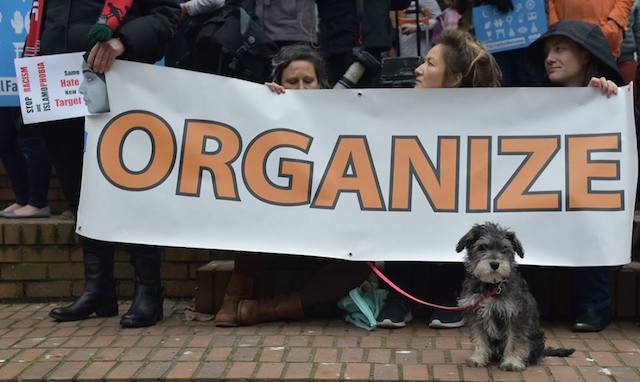
Photo by Pete Shaw
Baher Butti offered his perspective on oppression, one born from his experiences of living in Iraq when Saddam Hussein was in power. He recalled that in 1979, while Iraq was at war with Iran, Hussein expelled people of Persian origin, resulting in families and communities being ripped apart. Butti came to the US ten years ago, and Trump’s executive orders feel familiar. He also sees them as a betrayal of this country. “I came here. I started a new life. I believed in democracy, equality of people, and freedom of speech. But guess what? In the past week, I don’t know if I have my constitutional rights or not.” Echoing Sinclair Lewis, Butti then asked, “Is this really happening?”
It is really happening. But so is resistance. That resistance, noted SEIU Local 503 president Steve Demarest, must be grounded in working together. “We stand united because we know united is how we grow strong. So as the president of a labor organization, I’m here to bring you the message of organized labor–the message that has rolled down through our history, the message that people have sacrificed themselves for, the message that the only answer to division and suppression–and the answer is solidarity.”
What will matter going forward is what steps people take toward organizing–not just going to rallies–their resistance against the Trump Administration. Judging from the millions of people who have turned out at rallies, marches, and other events across the country protesting the Trump Administration and its actions, the potential for a movement that truly stands for human rights–economic, social, and cultural, just to name a few–is immense.
White supremacy is at the heart of our governing institutions. White supremacy is not a problem that will disappear with Trump’s rescinding of his racist executive orders or his impeachment. White supremacy will not disappear with Democrats taking back Congress in 2018 (a task that will be quite difficult considering the many racist laws that denied people their vote), or Trump losing re-election in 2020. Only sustained organization, education, and agitation can abolish white supremacist institutions and replace them with humane systems that truly reflect the values our country proudly professes, but so often willfully ignores with brutal outcomes.
Get involved! For a sample of the many groups organizing support for immigrants and refugees, and organizing resistance to the Trump Administration and white supremacy, go to the One Oregon Coalition’s webpage at: http://www.oneoregon.org/who-we-are/






